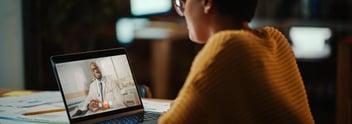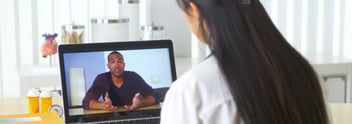The Future of Online Qualitative Research
The Advantages & Disadvantages of Online Focus Groups
In 2021 we published an article which considered the pros and cons of using Zoom for qualitative research. Its context was specific to a global pandemic in which face-to-face interviews were illegal and therefore impossible to set up. Zoom, Microsoft Teams, Google Meet and Skype offered qualitative researchers such as ourselves a way to adapt in a crisis. Now, as that crisis recedes, the LDA Research team considers the future of online qualitative research.
The Rise of Virtual Qualitative Research
The pandemic didn’t invent online qualitative research; it had been available for a while but certainly not as a dominant methodology within the medical market research sector. The accepted mode of qualitative research was the face-to-face interview, focus group, or phone interview. Remote interviewing was considered to “impede rapport, engender participant fatigue and restrict depth of interaction”. It was, therefore, the sub-optimal condition.
“It’s COVID that made video interviews acceptable, as these forms of communication and interviewing had been around for years before, but they’d never really taken off, as they were always considered inferior.”
- Qualitative Research Moderator
It wasn’t just researchers that embraced digital communications throughout the lockdown period. Everyone’s social interactions migrated - by necessity - online, and facetime, remote calling and Zoom are now wholly integrated into the way we communicate on a daily basis. Online qualitative research no longer presents the technological challenges it might once have done for participants.
Moving Online Market Research Forward
Now that social distancing is no longer in place, face-to-face focus groups and interviews are once more available to us as a methodology; what have we learnt from online interviewing, and what opportunities does it offer us moving forward?
“Video calls have got an obvious benefit of increased accessibility through convenience, as respondents can more easily fit them into their busy schedules as they’re not relying on time. There’s also the advantage of saving costs and you’re able to recruit from wider geographic areas.”
- Qualitative Research Moderator
There is no doubt that the online format has opened up the opportunity for under-represented patients and healthcare users to participate in debates about their experiences. We have found that people with impaired mobility, chronic health conditions, carers, and people living with mental health conditions such as anxiety or agoraphobia find it much easier to engage in a virtual setting.
As a medical market research company with a reputation for international research and global intelligence, we have experienced the democratisation of research made possible by online video interviews. Participants no longer have to travel to attend a research session; HCPs and patients are able to experience international perspectives that may have been unavailable to them previously.
Comparing Virtual and Face-to-Face Qualitative Research
“If you’re asking really specific questions…the quantitative side of things, I think there’s much more scope to do that virtually, but the qualitative side of things where it’s more of a conversation, there’s grey areas, there’s no right or wrong answer kind of thing, I personally think that’s way better face-to-face, because there’s so much you don’t get when you’re virtual.”
- Medical Market Research Client
The value of discussions that take place in the ’grey area’, as defined by our client, is something that feeds in to our current debate about whether and where to use face-to-face or virtual technology for interviews and focus groups. The LDA team is currently documenting and evaluating the advantages and disadvantages of working with each of these methodologies:
- Cost-effectiveness for clients.
- Ease of access for participants.
- Ease of access for clients to focus groups.
- Recording is integral to the technology.
- Greater global reach.
- Convenience of scheduling online interviews.
- Many participants turn off their camera.
- Drop-out rate is higher.
- 6 tends to be the maximum possible number of participants.
- More difficult to facilitate break-out rooms effectively.
- Different dynamic with more of a question-and-answer format, and less discussion between participants.
- Some participants say they would like the option of face-to-face.
- Participants share the same space and are all present in the same way.
- Discussion occurs between participants as well as with moderator.
- Clients get to meet at a central location and discuss the research.
- Break-out rooms are easy to set-up.
- Larger focus groups are possible.
- Participants are not distracted by home/work issues.
- Some participants may be excluded due illness, geographical distance, or family commitments.
- It’s more difficult to schedule research events that everyone can attend.
- Groups can find themselves deferring to one or more participants to whom they give higher status.
- Face-to-face focus groups and interviews are more costly to set up than online events.
- Clients may not be able to attend the entire event, or at all.
- External events such as train, tube or plane related strikes can disrupt plans.
Resisting the Normalisation of Online Market Research
Moving from one mode of communication (offline) to another (online) may be the right thing to do in a crisis, but that shouldn’t mean that it continues to be the only option once the crisis is over. There are many opportunities offered by online research but making it the default option would be to limit the quality, and depth of communication made possible by face-to-face interactions.
“It depends on the research you’re doing. If you just want quick answers then it’s great, but I think there’s still a lot of value in face-to-face.”
- Medical Market Research Client
“From a researcher’s perspective if I had to choose one that produced the best quality interview, it would be face-to-face. But do I believe the additional quality you get outweighs the added costs? Possibly not, but there are still situations where they would.”
- Market Researcher
At LDA Research we are most definitely embracing the opportunities made possible by online market research, whilst also being prepared to argue for a hybrid approach where we think that the value it can offer to clients justifies the additional costs.
Working With LDA Research
The LDA Research team has more than 10 years’ experience recruiting participants globally for medical market research projects. We employ a mix-and-match approach to our wide-ranging methodologies, which include online focus groups and interviews, video diaries, ethnographic studies, in-depth phone interviews, surveys, and questionnaires.
We have dedicated healthcare panels in the UK and US and have developed an extensive network of partners with international panels. Currently our field partners span Europe, the US, Canada, South America, South Korea, China, Mexico, Japan, the Middle East, and the South Pacific.
Would you like to talk to a member of the LDA Research team about working with us? Call us today on 01525 861436



